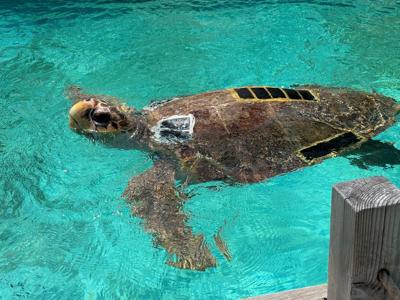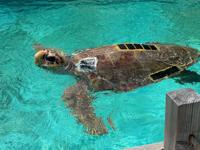OCEAN CITY, MD – After a year of long-term rehabilitation under the National Aquarium's Animal Rescue program, sea turtle Pegasus is approaching her final stage of recovery and preparing for release.
On June 4, 2024, the National Aquarium Stranding Response rescued a juvenile loggerhead sea turtle, later named Pegasus, from the shores of Assateague Island National Seashore. According to the rescue team, she was found floating and lethargic.
Named for their broad, muscular heads, studies have shown that loggerheads are the most abundant species of sea turtle nesting in the United States.
“Juvenile and adult loggerheads live in U.S. coastal waters, but many adults that nest on U.S. beaches migrate from neighboring nations like the Bahamas, Cuba, and Mexico,” according to the National Oceanic and Atmospheric Administration Fisheries.
Hatchlings and juveniles spend the first 7 to 15 years of their lives foraging in the open ocean environment. Then they migrate to nearshore coastal areas where they continue to grow for another decade or more before reaching maturity, according to NOAA Fisheries.
Researchers have identified that these populations, however, are on the decline due to bycatch in fishing gear such as trawls, gillnets and longlines. The unintended capture of this species can result in drowning or cause injuries that lead to death or debilitation.
In Maryland, specifically, there are 25 dead sea turtles strandings each year on average, according to Maryland’s Department of Natural Resources.
With nine distinct population segments listed under the Endangered Species Act (ESA), the rescue and recovery of Pegasus and others like her is vital.
“Pegasus was treated for chronic buoyancy control issues, which affected her ability to dive and swim normally—critical behaviors for a sea turtle’s survival in the wild,” said the National Aquarium Stranding Response. “With time, patience, and expert care, she has made remarkable progress.”
Pegasus has recently been transferred to the New York Marine Rescue Center to support the end of her recovery. Here she will have access to a larger outdoor rehabilitation pool where she can continue to build strength and improve buoyancy control.
National Aquarium Animal Rescue has released more than 350 rehabilitated animals since its founding in 1991 and has heavily relied on its alert staff and network of dedicated volunteers.
“We’re so proud of how far Pegasus has come and grateful for the collaboration between organizations working to give her a second chance at life in the ocean,” said the National Aquarium Stranding Response.


